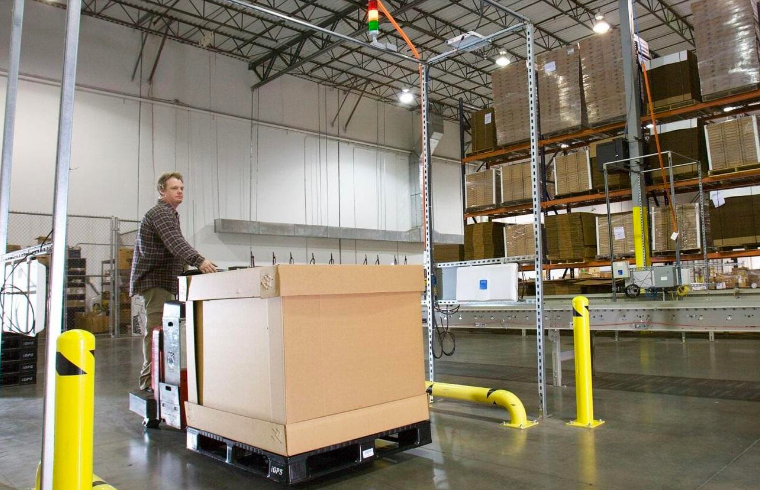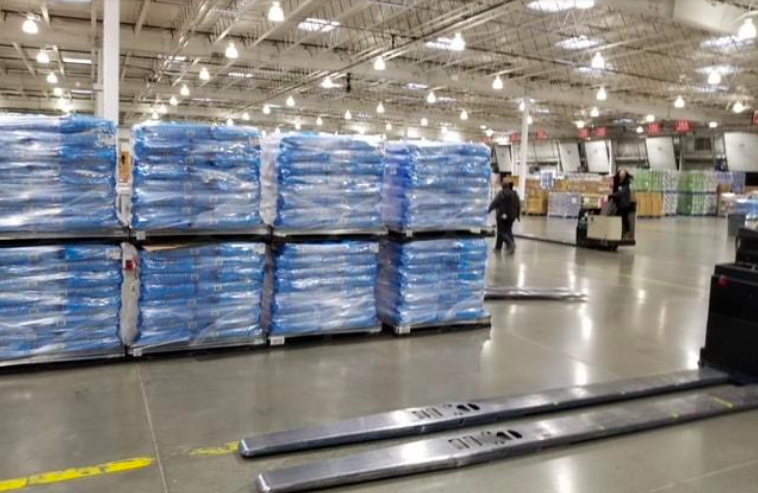Injuries in the warehouse are shockingly common. The Bureau of Labor and Statistics put the rate of injury at five per 100 warehouse employees in 2016. In comparison, logging, which is widely recognized as the most dangerous job in America, averaged 3.6 injuries per 100 employees during that same year.
The overwhelming majority of warehouse injuries are sprains and strains, which might be a surprise given the prevalence of heavy equipment designed to do the lifting. Yet, transport operations managers, warehouse supervisors, and logistics coordinators know there is plenty of work that is still done by old-fashioned muscle power. While a loaded pallet is moved with the aid of hydraulic forks, empty pallets are often stacked by hand for storage or reuse. When moved by hand, reusable wood pallets are heavy enough that they can easily cause injury and they may also have loose nails or splintered surfaces that can puncture flesh. Preventing injuries in warehouses, distribution centers, and manufacturing facilities requires strict adherence to pallet handling safety rules.
The Best Practices of Pallet Handling Safety
Pallet handling safety is all about common sense. These rules may seem basic, but without reminders, it’s easy to rush through a task without considering the safest approach. Whether you use wood or plastic pallets, following these best practices will prevent many common workplace injuries.
- Wear gloves and other personal protective equipment when handling pallets. Gloves and safety boots provide some protection against nails and rough edges and help prevent injury if a pallet is dropped. Eye protection is a must to protect against splinters and other loose debris.
- Never stand pallets on their side. A pallet on its edge isn’t stable and can fall over and injure a worker. Pallets should be set firmly, bottom down, on a flat surface.
- Use caution when standing on a pallet or moving between pallets. Stepping on a pallet to reach product or get between pallets puts you at risk of a foot or ankle injury.
- When manually lifting pallets, ensure that the platform you’re picking up moves freely before lifting. A pallet can snag on the platform below it and interfere with a smooth lifting motion, potentially causing a strain or other injury.
- Always clean up debris. Wood debris and other trash in the warehouse poses a slip-and-fall hazard and can damage equipment.
These basic precautions apply to those using both wood and plastic pallets, but wood pallets tend to make a working environment more dangerous and make following safety rules more crucial. Wood is prone to rotting and breaking, which may leave a pallet with jagged edges and huge sharp splinters. Loose pallet nails can puncture a glove or a boot sole and cause injury, while broken and loose deck boards can be a trip hazard when workers step on or between pallets. A plastic pallet, in comparison, is carefully engineered to provide a safer, sturdier alternative to wood.

Plastic Pallets Make the Supply Chain Safer for Employees
The first and most obvious safety advantage a plastic pallet has over a wood one is its weight. Wood rental pallets can weigh anywhere from 70 to 80 pounds. The Occupational Safety and Health Administration (OSHA) recommends that anything weighing over 50 pounds be lifted by two people, but if you’ve spent time in a warehouse you know that this suggestion is often ignored to save time and hassle. In comparison, a reusable plastic pallet weighs less than fifty pounds and has built-in, ergonomic handholds which allow it to be easily moved and carried by a single worker without undue strain and with much less chance of injury. Plastic pallets also have other features that make them safer than wood:
- Integrated Construction: Every part of a plastic pallet is fused together to create an integrated whole. Plastic platforms don’t use individual boards that may come loose or nails that may work themselves out of the wood and cause injury or damage equipment. This unitized design removes some of the most dangerous debris from the warehouse.
- Durability: The construction of a plastic pallet and the resilience of plastic material make it more durable than the wood equivalent. A plastic pallet can make between 80 and 100 trips through the supply chain, while wood pallets will only make 15 to 20. As a result of this greater durability, plastic pallets won’t break or crack like wood pallets and don’t shed pieces of wood in warehouses that can trip up employees and damage equipment.
- Full Deck: A plastic pallet has a full deck that lacks the gaps that run the width of a wood pallet deck. This means that empty plastic pallets stacked on top of one another won’t catch in this gap and snag there when an employee tries to retrieve one off the top. A full deck also makes plastic platforms safer to step on when the need arises.
Overall, plastic pallets create far fewer worker hazards than wood platforms. It’s a benefit of the lighter, stronger, and, above all else, more consistent plastic material they’re made of. Plastic can be molded into precisely the desired shape and engineered to have the ideal combination of precise dimensions, rugged strength, and light weight. A traditional wood block pallet, on the other hand, could be considered a “make-do” design hampered by wood’s inconsistent nature. The result is a product whose weight can vary by as much as ten pounds between pallets of the same type. This variation is a recipe for trouble. A warehouse worker can find out the hard way that one pallet weighs significantly more than another by coming away with a sprain or back injury.
Making the switch to plastic pallets in the warehouse can even improve facility safety in general.
In comparison, plastic pallets have a light weight that is consistent across all plastic pallets, and employees who’ve moved one will know what to expect from others. Making the switch to plastic pallets in the warehouse can even improve facility safety in general, as plastic pallets don’t leave nails and pieces of wood behind as they are processed. The absence of debris helps to prevent employee injuries and mishaps with machinery, leading to a safer environment for workers. Plastic pallets lead to benefits that go beyond employee and pallet handling safety. Fewer injuries and less machinery damage raise employee morale, reduce stress and hassle on the warehouse floor, and help your company save time and money.
The iGPS plastic pallet pooling program provides a durable, lightweight, full deck plastic pallet. To make your supply chain safer for your employees, give our team a call at 1-800-884-0225, email a specialist at switch@igps.net, or visit our contact page.



